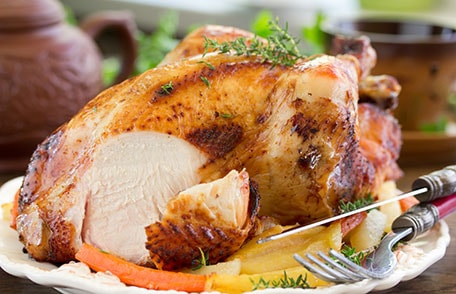Americans eat more chicken every year than any other meat. Chicken can be a nutritious choice, but raw chicken is often contaminated with Campylobacter bacteria and sometimes with Salmonella and Clostridium perfringens bacteria. If you eat undercooked chicken or other foods or beverages contaminated by raw chicken or its juices, you can get a foodborne illness, which is also called food poisoning.
That’s why it’s important to take special care when handling and preparing chicken.

Steps You Can Take to Prevent Food Poisoning
If chicken is on your menu, follow these tips when shopping, cooking, and eating out to help prevent food poisoning:
- Place chicken in a disposable bag before putting in your shopping cart or refrigerator to prevent raw juices from getting onto other foods.
- Wash hands with warm soapy water for 20 seconds before and after handling chicken.
- Do not wash raw chicken. During washing, chicken juices can spread in the kitchen and contaminate other foods, utensils, and countertops.
- Use a separate cutting board for raw chicken.
- Never place cooked food or fresh produce on a plate, cutting board, or other surface that previously held raw chicken.
- Wash cutting boards, utensils, dishes, and countertops with hot soapy water after preparing chicken and before you prepare the next item.
- Use a food thermometer to make sure chicken is cooked to a safe internal temperature of 165°F.
- If cooking frozen raw chicken in a microwavable meal, handle it as you would fresh raw chicken. Follow cooking directions carefully to prevent food poisoning.
- If you think the chicken you are served at a restaurant or anywhere else is not fully cooked, send it back for more cooking.
- Refrigerate or freeze leftover chicken within 2 hours (or within 1 hour if the temperature outside is higher than 90°F).
Copy and photo by Centers for Disease Control & Prevention
